Social Studies Lesson for Project Work/ソーシャルスタディレッスン紹介
Here is an introduction to lessons at CGK Afterschool.
CGKアフタースクールでのレッスンについて紹介いたします。
CGK’s two-month-long project works will be based on the main “Driving Question”.
Here are the Driving Questions for this “Social Study” lesson.
CGKの2ヶ月間に渡って行うプロジェクト活動では、メインとなる”Driving Question”に基づいて学んでいきます。
今回の「ソーシャルスタディ」レッスンでのDriving Questionはこちらです。
“What is perspective and why is it important to see through others lives?
"Perspective"とは何か?また、なぜ他の人の意見や考えを知ることが大事なのでしょうか?
The lesson theme was “2 Voice Poetry.”
レッスンテーマは「2 Voice Poetry」です。
We followed this theme and question with fun lessons each week that drew the student’s interest.
Here are the comments of Mr. Dan, the teacher who was in charge of the lessons.
このテーマと問いに沿って、毎週子供たちの興味を引き出す楽しいレッスンを行いました。
担当していたDan先生のコメントをご紹介します。
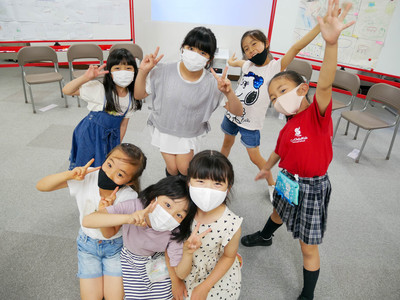
Week 1
This project requires a lot of abstract thinking from students and focuses on perspectives, view points, and the social construction of ideas that we take for granted. This will be challenging for students but will really open their minds to critical thinking and different ways of interoperating information and hopefully they can use these skills in conflict resolution at school and in their daily lives. We brainstormed ideas such as society, culture, culture shock and who they relate to the core idea of perspective. We talk about what can influence perspective such as culture, wealth, gender etc. We read the book they all saw a cat as a class and discussed its message. The cat in the story did not change physically but from the perspective of every animal the cat looked very different. Using a relatable example we acted out a scene that demonstrates how depending on the country etiquette is very different. When I first came to Japan I was shocked at how when entering somewhere like a ramen shop the staff would loudly shout greetings at me. Upon leaving the shop staff would also shout out goodbye and thank you to me with the whole shop being able to hear. As someone from a culture where quietness is valued highly in public dinning and shopping it was a big culture shock to me. Something that is so rude in the UK is considered polite in Japan and vise versa. There is no right or wrong to what constitutes politeness as it is all just a social construction but this very simple example was a good way for them to start to think about these ideas. We acted out the scenario at the ramen shop with each student having a role and they had a lot of fun making me jump in surprise. Next we looked at examples of two voice poetry and the students were made aware that they will be creating their own poetry and acting a little for their final project. We then created our own two voice poetry as a class looking at the difference and similarities between a teacher and students experience at school and performed it. The students did an amazing job and really got their head around the difficult idea of perspective. For the final part of the day students made groups and create posters from the perspective of two different people or things and presented them to the class.
このプロジェクトでは、生徒たちに多くの抽象的な思考を要求し、視点、見解、そして私たちが当たり前だと思っている考えの社会的構築に焦点を当てます。これは生徒にとってチャレンジングなことですが、批判的思考や情報を相互運用するさまざまな方法に生徒の心を開くことになり、学校や日常生活での問題解決にこれらのスキルを使えるようになることを期待しています。社会、文化、カルチャーショックなどのアイデアをブレインストーミングし、それらが「視点」という中核的なアイデアにどのように関連しているかを考えました。文化、富、性別など、視点に影響を与えるものについて話しました。クラスで「みんなで猫を見た」という本を読み、そのメッセージについて話し合いました。物語の中の猫は肉体的には変化しませんでしたが、すべての動物の視点から見ると、猫は全く違って見えました。身近な例を使って、国によってエチケットが大きく異なることを示すシーンを演じてみました。私が初めて日本に来たとき、ラーメン屋さんに入ると店員さんが大きな声で挨拶をしてくることにショックを受けました。お店を出るときも、店員さんがお店中に聞こえるように「さようなら」「ありがとうございました」と叫んでました。公共の場での食事や買い物では静かにすることが重要視される文化を持つ私にとって、これは大きなカルチャーショックでした。イギリスではとても失礼なことが、日本では礼儀正しいとされ、その逆もまた然りです。何をもって礼儀とするかは、社会的な構造にすぎないので、正しいも悪いもありませんが、この非常にシンプルな例は、このような考え方を考えるきっかけになりました。ラーメン屋でのシナリオを各生徒が役割を持って演じましたが、私が驚いて飛び上がってしまうほど楽しいものでした。次に、 two voice poetryの例を見て、生徒たちは、最終的なプロジェクトのために、自分たちで詩を作り、少し演技をすることを意識しました。そして、学校での教師と生徒の経験の違いや共通点に注目して、クラスで独自の二声の詩を作り、それを披露しました。生徒たちは素晴らしい仕事をし、視点という難しいアイデアを本当によく理解していました。この日の最後に、生徒たちはグループを作り、2つの異なる人や物の視点からポスターを作成し、クラスで発表しました。
Week 2
As a group we reviewed what we did the previous week and disused it in more detail. This was not just to solidify the knowledge in their heads going forward with a very abstract topic but also for the benefit of a class member who was absent the pervious week when the topic was introduced. Students also presented the posters they made on perspective to help the student who was not here the pervious week. We then read a story about perspective as a class and discussed the meaning of the story. We also made a small two voice poetry example as a class and then watch a video of them performing from their previous week. Students were then shown a slide show of different ways children go to school around the world and discussed at lengths the different perspectives on life these children must have. Finally, students then broke into pairs to discuss and then fill out a work sheet relating to creating our own two voice poetry as a class. Students needed to think of characters and a story and relate it to two voice poetry. Students were able to come up with nice stories that had a strong element of perspective, however they struggled to relate those stories to two voice poetry in a concrete way. This was expected as it is a difficult abstract concept that they need to use in order to create some original work. We will review next week and build from there.
グループで、前週の復習をして、さらに詳しく説明しました。これは、非常に抽象的なトピックを前にして、頭の中の知識を固めるためだけではなく、トピックが紹介された前週に欠席したクラスのメンバーのためでもありました。また、前週欠席した生徒のために、生徒たちは遠近法について作ったポスターを発表しました。その後、「Perspective」についての物語をクラスで読み、その意味を話し合いました。また、クラスで小さなtwo voice poetryの例を作り、その後、前の週に行ったパフォーマンスのビデオを見ました。さらに、世界の子供たちの学校への通い方を紹介するスライドショーを見て、子供たちが持っているであろう人生観の違いについてじっくり話し合いました。最後に、生徒たちはペアに分かれて話し合い、クラスでtwo voice poetryを作るためのワークシートを記入しました。生徒たちは、登場人物や物語を考え、それをtwo voice poetryに関連付ける必要がありました。生徒たちは、「Perspective」な要素の強い素敵なストーリーを考え出すことができましたが、それらのストーリーを具体的な方法でtwo voice poetryに関連付けることに苦労しました。これは、オリジナルの作品を作るために必要な難しい抽象的な概念であるため、予想されたことでした。来週には復習をして、そこから発展させていきたいと思います。
Week 3
Students reviewed their work from last week and listened to feedback from the teachers. I decided to split the project into two parts. Instead of trying to make an original story about perspective and incorporating it in to two voice poetry I thought it would be better to make an original story about perspective and then a separate two voice poetry story later to perform as a class. We then discussed the idea of when are you an adult and when are you a child looking at examples of things you can do in Japan the UK and the USA. The students were from Japan and with Mr Dan from the UK and Ms. Heather form the USA it was a good chance to talk about the differences between each country. We talked about when you can buy a house, drive a car, and work in these countries and all of the answers were really different. It was a way for them to start questioning preconceived notions of what childhood is and if it is real or just a social construction. Students then gave their opinion of what age they think they will be an adult with a wide variety of results that reinforced the message of the lesson. After this, students broke off into new groups and received a very large story board. Their task over the next two weeks is to create an 8 page story board original story with a perspective element. Students generally worked well together in groups to think of a story through discussion with teachers. However, one pair could not agree on the direction to take their story and would disagree. To help them went to each teams story and had the teams explain it to them and what the perspective element was. This did help but they still could not come up with a story that included a perspective element at its core. To solve this they sat with me in a `discussion circle` and I made sure each student had the chance to voice their ideas without interruption and wrote down their thoughts on the board in steps. When both students had done this they could see that both of their stories were about space in some way so we could agree that the core idea of their story should involve space. Next we moved down each list trying to combine elements from each into a story and sometimes just picking which part they preferred through a conversation with each other. They came up with a funny and unique idea for a story but needed a little help to fully agree on the ending and incorporate a perspective element. This took a long time and they didn`t make much progress compared to the other teams with starting to draw out their story board. However, the most important part was that in the end they listened to each other, expressed themselves, and reached a conclusion through communication. They will all have one more lesson to work on their stories next week.
生徒たちは先週の自分の作品を見直し、先生からのフィードバックを聞きました。プロジェクトを2つのパートに分けることにしました。「Perspective」についてのオリジナルストーリーを作り、それを2 Voice Poetryに取り入れるのではなく、「Perspective」についてのオリジナルストーリーを作り、後で別の2 Voice Poetryのストーリーを作ってクラスで演じるのが良いと考えました。その後、日本やイギリス、アメリカでできることの例を見ながら、いつまでが大人で、いつまでが子供なのかということを話し合いました。生徒たちは日本から来ていますが、イギリス出身のDan先生とアメリカ出身のHeather先生がいたので、それぞれの国の違いについて話し合う良い機会になりました。私たちは、これらの国でいつ家を買えるのか、車を運転できるのか、仕事ができるのかについて話しましたが、すべての答えは本当に異なっていました。子供時代とは何か、それは本当なのか、それとも社会的な構造に過ぎないのか、といった先入観を疑うきっかけにもなりました。その後、生徒たちは自分が何歳で大人になると思うか意見を述べましたが、レッスンのメッセージを補強するようなさまざまな結果が出ました。この後、生徒たちは新しいグループに分かれて、とても大きなストーリーボードを受け取りました。これからの2週間の課題は、「Perspective」の要素を取り入れた8ページのストーリーボードのオリジナルストーリーを作ることです。生徒たちは、先生とのディスカッションを通じて、おおむねグループで協力してストーリーを考えていました。しかし、あるペアはストーリーの方向性に同意できず、意見が分かれてしまいました。そのため、各チームのストーリーを見に行き、そのストーリーを説明してもらい、「Perspective」な要素とは何かを説明してもらいました。これは役に立ちましたが、それでも彼らは物語の核心に「Perspective」の要素を含む物語を考え出すことができませんでした。この問題を解決するために、彼らはDan先生と一緒に「ディスカッション・サークル」に座りました。Dan先生は、それぞれの生徒が中断することなく自分の考えを述べる機会があることを確認し、彼らの考えを段階的にボードに書き出しました。2人の生徒がこの作業を終えたとき、2人のストーリーが何らかの形で宇宙に関係していることがわかり、ストーリーの核となるアイデアは宇宙に関係しているべきだということで合意できました。次に、それぞれのリストの要素を組み合わせてストーリーを作り、時にはお互いの会話からどの部分が好きかを選ぶようにしました。彼らは面白くてユニークなストーリーのアイデアを思いつきましたが、結末に完全に同意し、視点の要素を取り入れるには少し助けが必要でした。この作業には時間がかかり、他のチームに比べてストーリーボードを描き始めるまでにあまり時間がかかりませんでした。しかし、最も重要なことは、最終的に彼らがお互いに耳を傾け、自分自身を表現し、コミュニケーションを通して結論に達したということです。来週のレッスンでは、さらにストーリーを練り上げる予定です。
Week 4
We discussed perspective before starting our project time and talked about a picture and what we saw. Everyone had a different opinion but could see what each person described. We also looked at an optical illusion of an elephant to see think about perspective and truths.
One team was able to finish their project and we hung it on the wall. Another group is done but wants to color more. Last group still needs some time to finish.
プロジェクトの時間を始める前に、「Perspective」について話し合いました。みんなそれぞれ違った意見を持っていましたが、それぞれの人が説明したことを見ることができました。また、象の目の錯覚を見て、「Perspective」や真実について考えました。
1つのチームがプロジェクトを完成させることができ、それを壁にかけました。他のグループは完成しましたが、もっと色をつけたいそうです。最後のグループはまだ時間がかかりそうですが、完成しました。
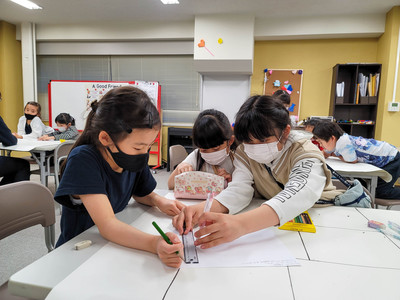
Week 5
This week students had the chance to put the finishing touches on their story boards. Two out of three teams worked really well on their story boards and were able to start working on a script for their story. When the teams have made their scripts they will be able to practice their story like a mini English show and make props to tell their story. One group however, despite being given a lot of direction over the last three weeks were not able to work together well and not able to include a perspective element in their unfinished story. During presentation this group was able tell the story with a perspective element to some degree but we will not have time to finish the story board now. The other two teams presented well. I have decided from next week to spilt up this team and have them join the other two teams to work with them on their mini English show preparation.
今週、生徒たちはストーリーボードの最後の仕上げをする機会がありました。3つのチームのうち2つのチームは、ストーリーボードの作成がとてもうまくいき、自分たちのストーリーの台本を作り始めることができました。台本ができたら、ミニ英語ショーのようにストーリーを練習し、ストーリーを伝えるための小道具を作ることができるでしょう。しかし、あるグループは、この3週間でたくさんの指示を受けたにもかかわらず、うまく連携できず、未完成のストーリーにパースペクティブな要素を盛り込むことができませんでした。プレゼンテーションでは、このグループはある程度、「Perspective」な要素を入れてストーリーを語ることができましたが、今はストーリーボードを完成させる時間がありません。他の2チームはよく発表していました。来週からは、このチームを別にして、他の2チームと一緒にミニ英語ショーの準備をしてもらうことにしました。
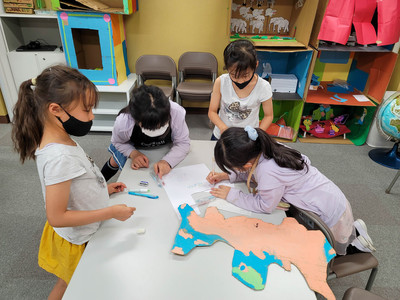
Week 6, 7
This week students made groups and discussed the perspective of a teacher and a student and wrote down ideas that they could use for their two voice poetry. After they had 20 minutes to discuss both groups feedback their ideas and through conversation we wrote their final two voice poetry that they will perform for final presentation on the white board. Students then went back to their groups and practiced telling their perspective stories. Once a group could tell their story very well to Mr Dan or Ms. Heather they could then work on telling their story with props that they will use to perform their story for final presentation. One of the girls was an outstanding group leader this week and deserves special mention.
今週、生徒たちはグループを作り、教師の視点と生徒の視点について話し合い、two voice poetryに使えるアイデアを書き出しました。20分間の話し合いの後、両方のグループがそれぞれのアイデアをフィードバックし、会話をしながら、最終的にホワイトボードに発表する2 Voice Poetryの詩を書きました。その後、生徒たちはそれぞれのグループに戻り、自分たちの視点でストーリーを語る練習をしました。Dan先生やHeather先生に上手に話ができたら、最終発表会で演じる小道具を使って話をする練習をしました。ある女の子は、今週のグループリーダーの中でも特に優秀で、特筆すべき存在でした。
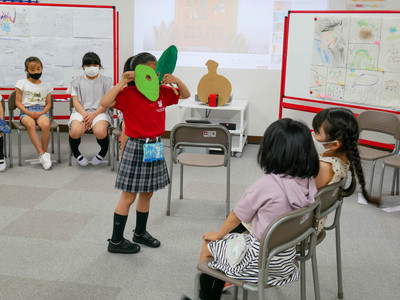
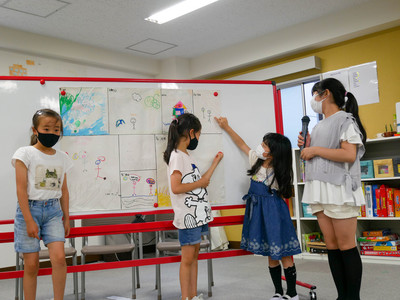
Here are the stories presented in the final presentation.
最終プレゼンテーションで発表したストーリーはこちらです。
1. The alien thought he was saying "Hello!", but the unique greeting startled the children and scared them away.
The alien, who just wanted to play with the children, started to cry. The children noticed this and came back to the alien, and finally understood the "different greetings" and played together.
1. 宇宙に行った子供たちがエイリアンに出会い、エイリアンは「Hello!」と挨拶をしたつもりでしたが、そのユニークな挨拶に子供たちは驚き怖がり逃げてしまいました。
一緒に遊びたかっただけのエイリアンは泣き出してしまい、それに気がついた子供たちがエイリアンのところに戻ってきて、最後には「ことなる挨拶」について理解し一緒に遊ぶことができました。
2. Children went to England, where Mr. Dan is from, and were invited to stay at his house.
The children were invited to a house where they were invited to visit Mr. Dan's home.
The children were surprised at the cultural difference, but they accepted the difference and had a good time, and returned to Japan.
2. 子供たちがDan先生の出身国イギリスに遊びに行き、お家に招待されました。
そこで日本の子供たちは靴を脱いでお家に入ろうとすると、イギリスでは靴は脱がずにそのまま家の中に入るという違いがありました。
文化の違いに驚きましたが、違いを受け入れ楽しい時間を過ごすことができ、子供たちは日本に帰ってきました。
Both of them were able to put their "Perspective" into their stories very well.
Their presentations were also very well done.
どちらも「Perspective」ことなる視点を上手にストーリーに入れることができました。
プレゼンテーションでの発表もとても上手でした。
Although the theme was abstract, the children were able to seriously engage with the interesting content.
抽象的なテーマですが、興味深い内容に子供たちも真剣に取り組むことができました。
Next time, we will tackle the theme of "Social Media Campaign."
We will consider the good and bad points of social media, which everyone uses, and think about ways to use its influence.
At this stage, we plan to introduce afterschool.
次回は、「Social Media Campaign」というテーマに取り組みます。
誰もが使っているソーシャルメディアの良い点悪い点について考え、その影響力を使う方法を考えます。
現段階では、アフタースクールを紹介する予定です。
We look forward to the next lesson.
次のレッスンも楽しみです。
Author Profile
-

-
Saeda Sueki-Au-Yeung - School Director (Japan)

School Director of CGK International School.
Graduated from a 4-year university in America, joined women's soccer team (National Champion).
After working in childcare and management at CGK Preschool and CGK Afterschool, she became the director of the entire CGK International School.





















